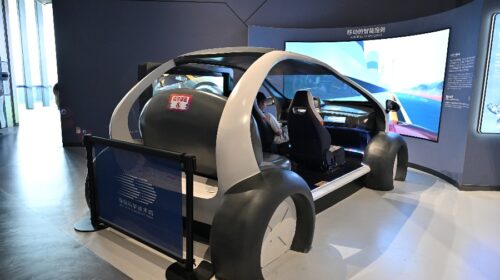CHINA BULLETIN: Return of the Lunar New Year Rush

Welcome to the latest Bamboo Works China Bulletin, where we recap the top China macro, industry and company developments from the past week and give you our spin on what it all means. In this week’s issue China’s Lunar New Year rush returns, manufacturing contracts, and Dell says “no” to Chinese chips. On a scale of 1 to 10, we give the week a 7 for offshore-listed China stocks.
Doug Young, Editor in Chief
MACRO
Return of the Lunar New Year Rush
The mad dash to catch up with the rest of the world and learn to live with Covid continued last week, with more deaths piling up and quarantines for inbound travelers getting scrapped as of Jan. 8. Amid all the Covid hustle, media reported on one thing that looks set to return this year after a three-year absence: China’s annual Lunar New Year travel rush.
The country expects travelers to make a staggering 2.1 billion trips by road, rail, water and air over the long holiday that starts on Jan. 21, double the 1.05 billion trips last year. Many Chinese haven’t spent the holiday at home these past three years, which will make the upcoming family reunions that much more meaningful, even if they’re marred by a few Covid cases.
Pretty Messed-Up Indexes, aka PMI
We feel a bit like a broken record with the latest economic indicators that show China’s economy in serious contraction once more. The latest Caixin PMIs for China’s manufacturing and servicesectors came in at 49 and 48 in December, respectively, marking the fifth straight month of contraction for the former and the fourth for the latter. Anything below 50 indicates contraction.
While China finally nixed its economy-killing “zero Covid” strategy in early December, the huge wave of infections that followed had a similar if not more chilling effect on economic activity. Things could finally start to improve in January as cases peak and begin to subside, though we may have to wait until February for indicators to turn more positive.
China Markets Celebrate the New Year in Style
The late-year rally for offshore-listed Chinese stocks continued in a shortened four-day trading week, as investors bet 2023 would be the “Year of the China Concept Stock.” The Hang Seng China Enterprises Index started the year with a 6.5% pop for the week, while the iShares MSCI China ETF also jumped 10%, and the broader Hang Seng Index gained 6.1%.
In our pages last week, we spotlighted the case of Dada Group, a delivery company whose shares started off the New Year by nearly doubling in the first three trading days of 2023. Similar gains for other companies appear to show that some larger investors are starting to pile back into these lesser-known midcaps in anticipation of a sustained rally.

INDUSTRY
Ozzie Coal Returns to China
After a couple of years of relations stuck in deep freeze, China and Australia appear to be trying to move to a warmer place. In the latest sign of a thaw, Beijing has reportedly allowed several Chinese companies to resume importing Australian coal, ending an informal ban dating back to 2020.
The tiff began at the pandemic’s start when Australia joined the U.S. in calling for an investigation of Covid’s origins, and things only got worse from there. But China was really shooting itself in the foot, as the ban only led to a shortage of coal and higher electricity prices as a result. Relations began to improve after both countries’ foreign ministers met last month.
Dell’s Chip Change of Heart
In an interesting new wrinkle to the U.S.-China chip wars, Japan’s Nikkei reported last week that computing giant Dell is aiming to stop using made-in-China chips by 2024, and has also told its suppliers to use less China components. Dell is making the move as rival HP also examines its supply chains and asks its suppliers to diversify beyond China.
It’s a bit unclear if there’s any U.S. government prodding behind Dell’s moves, or whether it’s purely a business decision. Our guess is it’s probably a bit of both, since there’s certainly no reason for Dell to completely abandon made-in-China chips, which includes chips made by foreign companies in China as well as ones from Chinese manufacturers.
Less Working on the Railroad
China continues to wind down its frenzy of railway construction after spending hundreds of billions of dollars to build the world’s biggest high-speed rail network. New data show investment in the country’s rail network fell 5.1% last year, while fixed asset investment fell by an even larger 11%, marking a third consecutive year of decline.
It’s not too surprising that the figures are falling, since there’s only so much railway you can build. That’s also the broader picture for China’s infrastructure in general, which has become quite mature after more than two decades of breakneck building. Which means Beijing may soon have to look for other ways to stimulate the economy.

COMPANY
Ant Booster
One of the biggest corporate headlines last week came from the beleaguered Ant Group, which got a regulatory green light to boost its registered capital by a hefty 10.5 billion yuan, or around $1.5 billion. More specifically, Ant’s online lending unit got the nod to raise the figure to 18.5 billion yuan from a previous 8 billion yuan, allowing it to bring in new investors.
The move triggered buzz that two years after the spectacular collapse of its mega IPO due to a clash with regulators, Ant may finally be regaining favor with Beijing. That would jibe with broader signals that show Beijing is finally scaling back its wave of regulatory crackdowns from the last two years targeting everything from fintech to education and online gaming companies.
Apple Reconsiders China
Amid all the recent signs that Apple was growing increasingly frustrated with China, a headline last week signaled the iPhone maker isn’t giving up just yet on manufacturing in one of its most important markets. That news said Apple added homegrown mainland company Luxshare to its list of contract manufacturers that can make premium iPhone models.
Luxshare has been an Apple partner since 2011, and has been gradually moving up the food chain in terms of what it makes for the U.S. company. In fact, one could even see Apple’s move as a type of diversification since all of its current contract manufacturing partners hail from Taiwan, even though they do most of their manufacturing on the Chinese mainland.
More Tesla Price Cuts
Following its meteoric rise, the woes just can’t stop coming for former electric vehicle (EV) superstar Tesla. The company slashed prices for its Model 3 and Model Y cars in China late last week, equating to cuts of between 6% and 13.5%, according to Reuters calculations. The cuts followed another round of reductions less than three months earlier.
We’ve touched on this theme before, namely that China’s EV market looks set to hit the skids in 2023, following two years of very rapid growth fueled by government incentives. A number of those incentives ended on Dec. 31, and now it appears that EV makers are scrambling to clear inventory as demand shows signs of starting to plunge.
AND FROM THE PAGES OF BAMBOO WORKS
| Hong Kong SPAC Bust 2022 was meant to be the “Year of the SPAC” in Hong Kong, as the city rolled out a new law for public listings through special purpose acquisition companies (SPACs). But it hasn’t quite worked out that way, with only five SPACs listing in Hong Kong last year – none of which has found an acquisition target yet. The year began with much bigger hopes, and, in fact, the Hong Kong Stock Exchange ended up receiving 15 SPAC applications in total last year. But the timing wasn’t great as global stock markets did quite poorly last year, which ultimately affected SPACs as well. |
| Secoo Tidies Up on Hopes for New Luxury Boom It was once an e-commerce star, banking on China’s budding love affair with luxury goods like handbags and designer clothes. But these days Secoo has fallen out of investor favor, and reportedly even filed for bankruptcy last year to clean up a battered house pummeled by three years of pandemic controls that killed China’s appetite for luxury. The company’s latest financial report shows its revenue declines appear to be bottoming out, even as Secoo is a shadow of its former self with a market value of just $15 million. Despite all its woes, the company could be well positioned to bounce back if a wave of “revenge luxury spending” erupts in China, similar to what we’ve seen in other parts of the world. |






